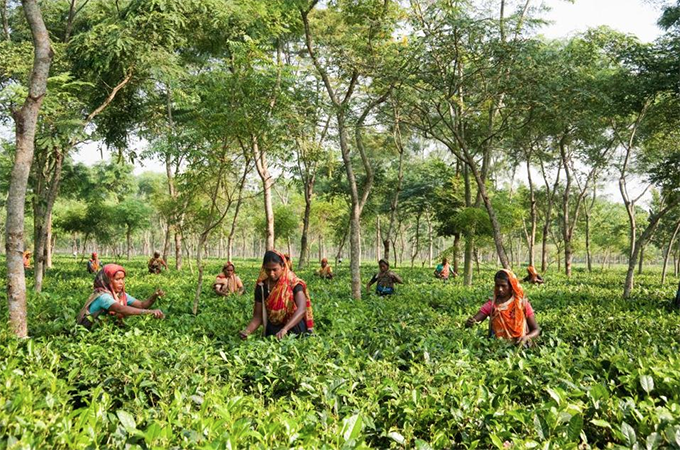
Women work in the Teatulia Garden in Bangladesh. Photo courtesy of Teatulia.
As the strategic sourcing manager for Purdue Dining & Culinary, Misty Snyder is often looking for new products that can have a positive impact on the student dining experience and the environment.
“I’m in food sourcing because I’m passionate about what’s going on with our environment,” says Snyder. “I look at the things we’re doing right and what we can change through our supply chain because the impact we can have is huge.”
A serendipitous meeting at a regional conference produced a connection that led to the addition of Teatulia Organic Teas to Dining & Culinary’s offerings – a connection that is making an environmental and social impact on the far side of the globe and could produce additional educational opportunities for Purdue staff and students.
It all started when Snyder traveled to the National Association of College and University Food Services (NACUFS) Midwest Region conference, held at the University of Iowa. At the time, Snyder was feeling ill. During the event, she met an individual who recommended and brought her a tea that helped her feel better.
Several months later, Snyder was once again on the road representing Dining & Culinary at the national NACUFS convention in Denver, Colorado – where she ran into the same individual, who turned out to be a representative from Teatulia. It was then that Snyder began to learn Teatulia’s story and realize the impact a connection with the organization could have.
The Teatulia Cooperative, located in the Tetulia region of northern Bangladesh and known locally as the Kazi Shahid Foundation (KSF), supports the country’s first and only organic tea garden. The land the garden uses was once stripped barren, which led to impoverished conditions in local communities. The organization now works closely with local women to teach sustainable, organic farming to members of its co-op, which employs more than 600 workers and supports more than 1,700 community members.
The co-op also supports the local community through a cattle-lending program. In this program, members are lent a dairy cow that can be paid back by selling its milk and dung. Members can also keep any calves reared by the cow during the loan. Most members pay off their cow within two to three years. Cows also provide members of the co-op with dairy products, sources of income and even the ability to make methane gas. The success of the program has increased employment in dairy farming by 450 percent and individual co-op members incomes by 300 percent. Local investment in education has also increased literacy by 50 percent.
“After doing my homework and learning this, I thought even if we pay a little bit more for some tea bags, the connection for our students to something that is so well thought out, executed and forward-thinking is important,” says Snyder. “The world they live in is global. They know if they come and get this tea, their impact is stretching just by the choice of drink they’re having.”
Snyder got to see firsthand the impact the Teatulia has on its community when she traveled to Bangladesh as part of a trip where Teatulia hosted members of another university last spring. When the opportunity to take the trip came up, Snyder said she couldn’t pass it up.
“One, I just had to see it,” says Snyder. “And two, I wanted to see if there might be opportunities for future development, whether it be for staff or students.”
Snyder flew into Dhaka, the national capitol, and traveled via plane up to the Tetulia region, located in the northern part of the country. Between arriving at the airport at 3 a.m. and some chaotic traffic encounters, the journey was an adventure – but Snyder says the payoff in seeing the gardens and getting to witness firsthand their impact was well worth the trip.
“As a staff, they’re raising all of their own food for whoever is working and they’re doing all of that organically and sustainable,” says Snyder. “They have ponds that they’re raising fish in, cows that that they’re getting cheese from and everything is a full, closed-loop system set up all the way across the board.”
Snyder spent a day learning how to harvest tea with the women who perform the harvesting and visiting the factory where the tea is dried. She also got to visit the village and the homes of some of the women who worked in the garden, visit the schoolhouse and played soccer with local children.
“They took us up to the garden and we spent about half the day learning how to pluck tea,” says Snyder. “We even planted our own tea plant. It’s marked with our names and it will be there forever.”
One final adventure remained – and that was getting out of the country. Snyder’s trip took place just as the COVID-19 pandemic was beginning to impact international travel, which created a difficult situation in trying to leave Bangladesh. She was able to get on the final flight out of the country on March 14, 2020.
In reflecting on her trip, Snyder says she sees numerous possible applications for future Purdue staff and students to learn from the partnership. Challenges remain to solve for that to happen in addition to the conclusion of the pandemic, including travel itineraries and in-country transportation as well as ties to academic programs. Students and staff studying or interested in agriculture, engineering and social sciences could all benefit from visiting the garden, which Snyder hopes to coordinate as soon as possible.
“When I think about all the possibilities, it’s amazing that we could get all of this from tea,” says Snyder.
Teatulia products are sold on campus. By purchasing from Teatulia, students, staff and visitors can continue to make an impact in a community far from the West Lafayette campus.
